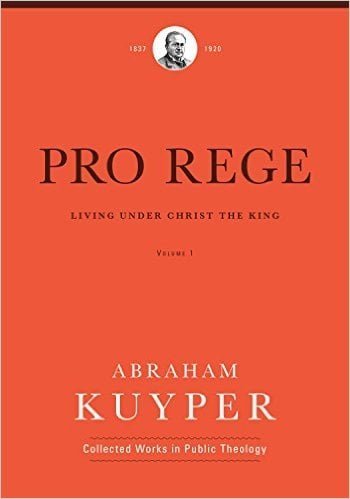⏱️ Estimated Reading Time: 3 min read
“There is not a square inch in the whole domain of our human existence over which Christ, who is Sovereign over all, does not cry, Mine!” You have probably heard this quote, one of Abraham Kuyper’s most famous of all. Part of the reason this quote is so famous is that this was the lifeblood of Kuyper’s thought and theology – the Lordship of Christ. Lexham Press knows the value of Kuyper’s writing, particularly in this area, and so they have undertaken the mighty task of creating the Collected Works in Public Theology series. What once were newspaper articles and lectures have now turned into multi-volume works offered to the church. Pro Rege is a 3-volume series centered on Christ’s Lordship.
This first volume is from writings completed in 1907. The editors provide a very honest, helpful, and even critical peering into Kuyper’s work, showing where he excelled and where he didn’t. Getting into Kuyper’s material, we find that Kuyper has much to be dismayed at. He puts it succinctly on page 18: “In public life, there is no regard whatsoever for Jesus’ kingship.” Kuyper is writing in an age not our own, in a context not our own, and yet his message resonates with us. I write this review in 2016 and from America, and I have to agree with Kuyper’s scathing assessment. Christ has become to us our prop for what we want – a “national ardor” for “the best of all earthly kings” (22). And those of us who attempt mere flight away from these cultural endeavors find that it is ultimately inescapable. As Kuyper says, “you should never imagine that the atmosphere you breathe has no influence on you” (36).
There are many ways in which Christ’s Kingship in this world has been undermined, the focus of section two of this volume. In this section, Kuyper notably talks at length about miracles, linking them to human dominion over the creation and nature. Our image-bearing qualities make us have dominion, and miracles are the public manifestation “that a power greater than nature could reveal itself in nature, operate in it, manipulate it, and make it serve a higher purpose (136).
In section three, Kuyper moves away from cultural analysis and dives deeper into biblical foundations for the kingship of Christ. Kuyper rightly argues that such kingship should ultimately infect how we do evangelism, how we preach, how we work in the world, and how we read our Bibles. We must read the world with a Christ-as-King lens.
Kuyper doesn’t get everything right (just like every other theologian), but he writes with such conviction and passion for the world that it makes for engaging, inspiring reading. His prophetic and political voice has much to say for the 21st century. I hope that you will find Pro Rege to be a volume worth your attention, as well as the rest of the Collected Works of Public Theology series. A major thanks to Lexham Press and Acton Institute for entering this laborious, but important endeavor for the church.




